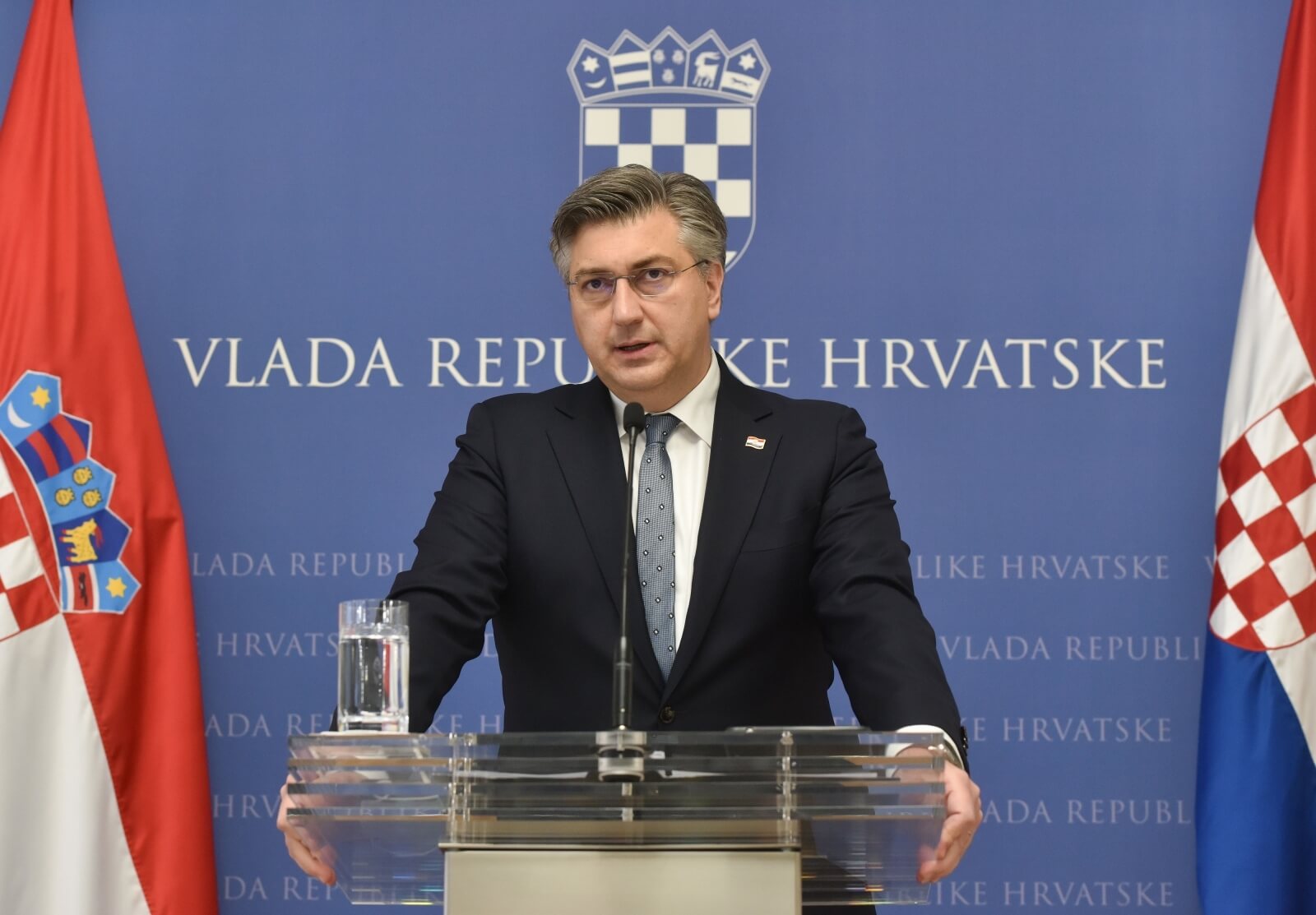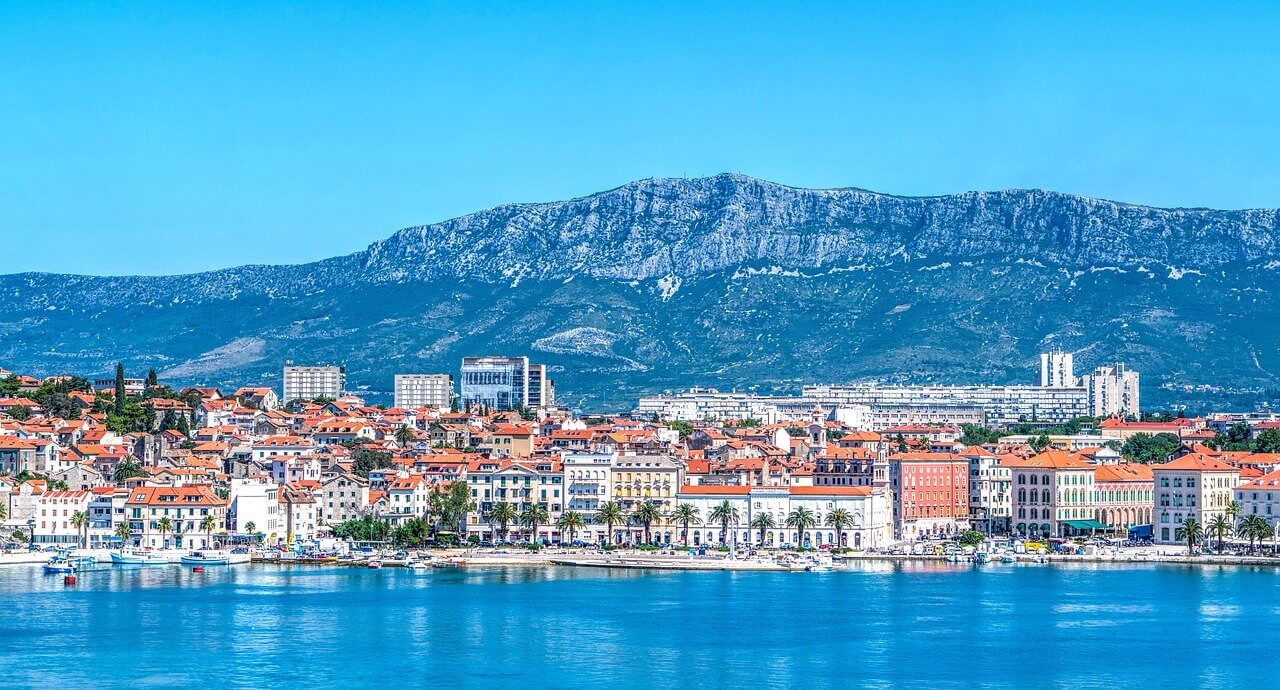Croatian Drive-In Vaccination Point Begins Work in Virovitica-Podravina!
May the 4th, 2021 - The very first Croatian drive-in vaccination point has been put into function in Virovitica-Podravina County as issues surrounding the vaccination process continue nationwide.
The Croatian vaccination rollout has been plagued by inadequate amounts of vaccine doses, problems at the European Union level involving contracts with the industry and of course, the latest in a series of unfortunate events being the failure of the online vaccine registration platform - Cijepi se.
You'd think that the very first Croatian drive-in vaccination point would be in the City of Zagreb, but it seems that a much smaller part of the country has come up with the idea first. Virovitica-Podravina county has decided that this is the best and quickest way of vaccinating the population against the novel coronavirus and hopefully bringing an end to the pandemic.
As Poslovni Dnevnik writes, Miroslav Venus, the president of the Croatian Epidemiological Society, described to N1 how the brand new Croatian drive-in vaccination point functions.
“Drive-in vaccination is much more safe epidemiologically, because when people come on foot, they can end up spending a lot of time right next to each other. This is also more pleasant for people as an experience,'' explained Venus, adding that the vaccination rollout in Virovitica is being carried out at three points and that in addition to the drive-in at two points, the classic way of handling the vaccination process is also being performed, where people can still come on foot to receive their dose.
"By the end of June, we could have 50-60 percent of the population vaccinated against the novel coronavirus at the county level," Venus said.
Venus has also assessed the situation in the country when it comes to vaccinations as good, regardless of the problems that have arisen on both a national and at the European Union level.
For all you need to know about coronavirus specific to Croatia, including travel, border and quarantine rules, as well as the locations of vaccination points and testing centres across the country, make sure to bookmark our dedicated COVID-19 section.
Marko Rakar Discusses Cijepi Se Vaccination Platform Failure
April the 27th, 2021 - Croatian IT expert Marko Rakar, who has more than thirty years of experience in the field under his belt, has publicly criticised the now failed Cijepi se vaccination platform, referring to it as sloppy and irresponsible.
As Poslovni Dnevnik writes, IT expert Marko Rakar spoke on N1 recently about the problem with the Cijepi Se vaccination platform, which, according to reports, doesn't function at all, and which some larger healthcare institutions across the country have totally given up on using. Health Minister Vili Beros, on the other hand, says that everything is working - maybe not perfectly, maybe not the way they would like, but - it's still working.
"The question is whether there's a Cijepi Se vaccination platform at all," Rakar said at the beginning.
"It's merely a form on the Internet that doesn't perform even basic data collection properly. The Ministry's statement differs drastically from the Minister's interpretation of it. But the fact it isn't working has been confirmed by the 200,000 people who signed up, just 5,600 of them were referred through the platform. And 4,000 people, myself included, were wiped off it.
We know the Cijepi Se vaccination platform isn't working, everyone who has used it has testified that it's unusable, that it isn't integrated, that the data is incorrect... It happens that you have to enroll yourself on the platform, and a doctor then has to examine everything and manually transcribe it all somewhere else. What then is the point of the platform? Is it okay for their job to involve retyping something from one screen to another?'' Marko Rakar asked.
He said that it has been known for fifteen months now that there will be mass vaccination against the novel coronavirus taking place, and that there has been enough time to organise the system.
"Our Health Ministry is acting as if everything has come as a big surprise for which they'd not prepared. But doctors carry out vaccinations every day on a number of other grounds, on newborns, school children, they do flu vaccinations… It's unclear how this situation happened. Looking through a series of such bizarre events, we can conclude that someone needed to make some money and deliver something for the sake of something delivered,'' Rakar added.
He explained how long it takes to make a platform like the Cijepi Se vaccination platform.
"If we look at it very simply, what people can see through the Cijepi Se page can be done in one afternoon, but what lies behind all of that is much more important - the data must be shared with HZZO's IT systems, with hospitals, it must be compared with other databases…
However, those are stable, well-documented systems. In seven days this should be able to be done without much trouble. Considering that this has been being talked about for fifteen days now, we'd have been able to develop such a platform twice in that period,'' said Rakar.
It is, he added, a very simple task that is repeated every day and which appears very often in the work of people engaged in the development of such systems.
“This application with such specifications is at the level of high school education or for the first or second year of college. There's no excuse for it not to be working well. The vaccine system isn't integrated. This means that when you enter an OIB or MBO the system won't check if you've already been vaccinated or not, but this check can happen at later stages. If these people end up being invited again, we can say that it absolutely does not work at all,'' said Rakar.
A few days ago, the Health Ministry confirmed that a number of people who had signed up to be vaccinated had been deleted from the Cijepi Se vaccination platform.
"The first 4,000 people who applied were deleted. Of the 4,000 people who were wiped off the system, some must have become infected in the meantime, and someone could have since ended up on a respirator. The question of the responsibility for such a sloppy platform arises. I've been involved with informatics for over 30 years and I've never seen something so sloppy or irresponsible,'' concluded Marko Rakar.
For all you need to know about coronavirus specific to Croatia, including travel, quarantine and border rules, as well as the locations of testing centres across the country, make sure to bookmark our dedicated section.
Paradoxical Croatian COVID-19 Vaccination Problems Continue
April the 9th, 2021 - The paradoxical situation with the Croatian COVID-19 vaccination process is continuing as a city five times smaller than the Croatian capital of Zagreb vaccinates twice the amount of people.
As Poslovni Dnevnik writes, following the general rehearsal held on Tuesday this week, to which 90 Zagreb residents of those invited (500 invitations were sent out) for vaccination responded, only 783 of the 1,500 invited ended up actually coming and being vaccinated on Wednesday. Significantly fewer people came than were actually invited, which poses a concerning issue.
"We aren't very happy with the response. In any case, it's better than it was the day before,'' stated the Andrija Stampar Institute's Tatjana Petricevic Vidovic.
Over in Rijeka, the same mass vaccination process took place using AstraZeneca, but the results there were much, much better. In a city six times smaller than Zagreb, twice as many people were vaccinated in one day than in Zagreb - 1,400. This news signals continuing issues surrounding the Croatian COVID-19 vaccination process which aren't likely to clear themselves up soon.
As of this week, everyone living in Zagreb should probably be making their way (upon invitation) to the Zagreb Fair (Zagrebacki Velesajam) for vaccination against the novel virus. There is no more vaccination with the first dose for outpatient clinics, but instead for those who applied through the vaccination portal and those who were on the lists of their family doctors who are also invited.
"It's done in the sense of the GP taking out his notebook again and calling his patients who haven't been vaccinated yet, asking them if they want to be vaccinated with AstraZeneca and if they do want to, he then he refers them them for vaccination at the Zagreb Fair," explained the president of the Croatian Family Medicine Coordination, Natasa Ban Toskic.
Thus, the aforementioned Zagreb-based paradox was created. Finally, in a long and somewhat embarrassing Croatian COVID-19 vaccination process, there are now many mass vaccination points and a slightly larger number of doses has finally arrived, but there have also been mass absences of citizens and problems with invitations being accepted.
"Are you thinking of just letting everyone come next week, and whoever wants to get vaccinated can come and receive it?" Health Minister Vili Beros was asked.
"Thank you for that question. Theoretically, perhaps in the way you suggested, we'd end up harming some older people who had previously applied to be vaccinated. However, of course, in the given circumstances, we'll do everything to make sure we use up every dose,'' Beros answered for RTL.
He added that this was not ruled out as an option as the Croatian COVID-19 vaccination process goes on. “We need to be flexible and do what's best for the healthcare system,” he concluded.
For more on coronavirus specific to Croatia, including travel, quarantine and border rules, as well as testing centre locations across the country, make sure to bookmark this page.
Highlights of the Week: 5 Big Events in Croatia from March 22-28, 2021
March 28, 2021 – From Croatian destinations drawing more attention to Covid business support plans in April, here are TCN's five highlights of the week, recapping the big events in Croatia from March 22 to 28, 2021.
Looking back on the past week, after a year of downfall, it is clear that Croatia is recovering in a very positive way. The pandemic has put the world on hold for a while; despite the uncertain times, Croatia is moving forward. Businesses around the country will continue to receive government support in the form of financial aid throughout April, there are plans for mass vaccination in Zagreb after Easter, and another boost for Croatian tourism is in the works - and that is just part of it.
From Monday to Sunday, we list five events featured on the front pages of Croatia's news portals.
PM Andrej Plenkovic Confirms Covid Support for Businesses in April
Following a recently held cabinet meeting, Croatian PM Andrej Plenkovic confirmed that the government will continue to provide support for companies that qualify during April. Additionally, the government will reimburse electricity bills for all citizens affected by the Petrinja earthquake to aid. The HAC toll fee collections along the Zagreb-Sisak motorway will also be reimbursed.

Andrej Plenković. Photo: Davorin Visnjic/PIXSELL
Mass Zagreb Citizen Vaccination to Commence After Easter
Despite the recent vaccine delivery dynamics Croatia has been through, Dr. Zvonimir Sostar, the director of Zagreb's Dr. Andrija Stampar Institute, confirmed a large vaccination will be organized in the Capital. The aim is to vaccinate around 6,000 citizens a day, six days a week which approximately equals 36,000 vaccinated people.
 Pixabay
Pixabay
Just over 100,000 people have been vaccinated in Zagreb in two different phases. Due to vaccine shipment delivery issues, Croatia hasn't received the Moderna vaccine for the third week in a row, affecting the plans. But the country is hopeful the situation will improve following the Easter holidays.
Plaja-Beach Finder: Croatian App to Digitalise All of Country's Beaches
To help tourists answer the famous "Where is the beach?" question, a Croatian mobile app made by a Split resident will make everyone's life a little bit easier. Research has shown that this is the most common question asked by tourists in all areas of Croatia, from Dubrovnik all the way to Pula. After working in tourism for 15 years, Dejan Gepo saw the need to create an online beach guide to suit everyone's needs and minimize paper waste with useless and outdated maps.

Pixabay
Each beach has a detailed description written by the Tourist Board, including the location, content on offer, and images. There is a navigation option that enables tourists to find the beach easily, and there is an option where you can virtually view every beach via 360 views. Users can provide comments and rankings for each beach depending on experience, enabling tourists to find their perfect beach match.
The Plaja-Beach Finder mobile app has been available for download since January the 24th this year and has been downloaded more than a thousand times so far.
EuroNight Train: Slovaks, Austrians Introduce Line to Split, Tickets On Sale
Despite the continued uncertainty that Coronavirus presents and the reduction of air traffic, Austrians and Slovaks will introduce a brand new night train line in the summer of 2021. The route, starting from Bratislava, passes through Vienna and Graz with the Dalmatian City of Split as the final stop.

Pixabay, Split
The EuroNight train plans to commence on June 18th, 2021, to run twice a week until the end of the summer season, mid-September 2021. Tickets can already be purchased from Vienna to Split, 29.90 euros for seats and 69.90 for beds.
The night trains allow guests to travel in a more sustainable way and aids in reducing climate change.
2022 World Cup Qualifiers: Croatia Defeats Cyprus 1:0 in Rijeka
After losing to Slovenia last week, Croatia came back strong and won against Cyrus as an outstanding highlight of the week. Croatia and Cyrus played last night in Rijeka for the second round of the 2022 World Cup qualifiers Group H.
Croatia's coach, Zlatko Dalić switched up the lineup for the game, going for a 4-3-3 formation. Croatia was powerful from the start of the game with Mario Pašalić scoring from a header for 1:0, in the 39th minute. Luka Modrić also recorded his 135th cap for the national team, making him the most-capped player in Croatia history!

Photo: Igor Kralj/PIXSELL
The loss to Slovenia complicated their road to the World Cup, as only the group winner qualifies directly for Qatar 2022. Croatia will play Malta on Tuesday in Rijeka at 20:45.
To read more about sport in Croatia, follow TCN's dedicated page.
To follow all news from Croatia, subscribe to our newsletter.
Mass Zagreb Citizen Vaccination to Commence After Easter
March the 27th, 2021 - Mass Zagreb citizen vaccination against the novel coronavirus, SARS-CoV-2, is set to take place just after Easter.
As Poslovni Dnevnik writes, following Easter, a large mass Zagreb citizen vaccination point will be organised here in the Croatian capital. This was confirmed by Dr. Zvonimir Sostar, the director of Zagreb's Dr. Andrija Stampar Institute.
"We're preparing for a large vaccination point to be placed at the Zagreb Fair (Zagrebacki Velesajam), and the desire is for it to be on World Health Day on April the 7th, 2021. Zagreb will do everything it can to carry out the vaccination process according to the current plan,'' explained Dr. Zvonimir Sostar for Vecernji list.
Vaccine delivery dynamics, which have been causing tremendous problems recently, are key to realising that plan. At this large vaccination point, Zagreb could vaccinate about 6,000 citizens a day, which, with six days of vaccination, would be approximately 36,000 vaccinated people per week. In one month, that would be between 150,000 and 200,000 vaccinated people from just this one location.
Despite the plans, vaccine deliveries continue to be uncertain. For the third week in a row now, a planned shipment of Moderna still hasn't arrived, which is a vaccine that has otherwise been delivered regularly so far.
Just over 100,000 people have been vaccinated in Zagreb, and in the first phase, these were the users of homes for the elderly, the staff working at said care homes and healthcare employees. In the second phase, the elderly and chronically ill patients were vaccinated in health centres - of which about 70 percent were vaccinated at health centre ''mini-points'', where teams were vaccinated outside of normal working hours. About 6,000 of Croatia's healthcare workers were vaccinated at the Dr. Stampar Institute, where about two hundred citizens are being vaccinated every day.
As of this week, outpatient clinics in Zagreb are no longer receiving the same number of vaccine doses as they were previously. Those with more patients over the age of 65 and chronic unwell patients, regardless of their age, have now received 32 doses (20 doses of AstraZeneca and 12 doses of Pfizer each), and those with fewer patients in these categories received twelve doses of vaccine each.
So far, each clinic has received 112 coronavirus vaccine doses in four weeks, between 26 and 32 doses per week, depending on the amount of AstraZeneca doses received.
For current information on coronavirus specific to Croatia, including travel and border rules, as well as testing centres across the country, bookmark this page.


